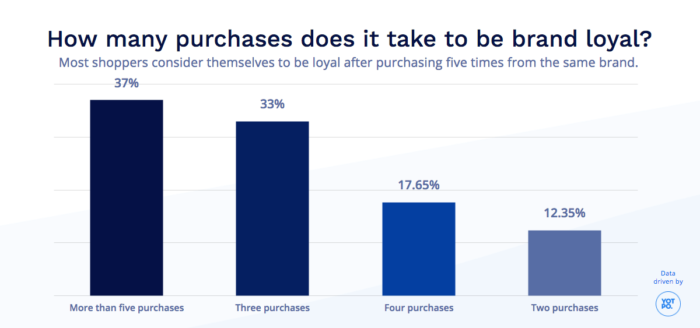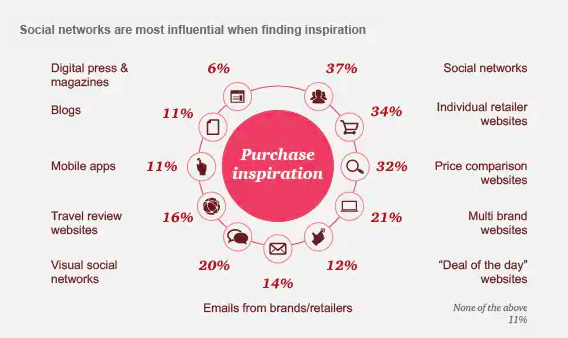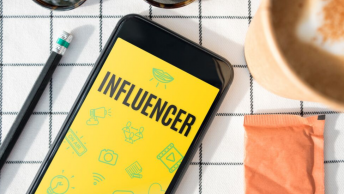All digital brands have the goal of achieving brand loyalty amongst their customers. But what does brand loyalty mean to consumers?
Consumers Don’t Want to Shop Around
The majority of American adults say that if they find a product that suits them, they want to keep buying it. Since they have what they need, they do not want to waste time trying other things. After all, they may not work as well.
But how many repeat purchases does it take for a person to think of themselves as loyal to the brand they are purchasing from?
Survey results from Yotpo make it very clear that it takes more than one repeat purchase for a consumer to consider themselves brand loyal.
Brand Loyalty: The Magic Number
According to over half of those surveyed, it takes at least 4 purchases for a customer to consider themselves loyal to brand. This includes 37% of respondents, who feel that true brand loyalty starts at 5 purchases minimum.
How to Keep Customers Coming Back
It is no secret that customers have very high standards for brands. They will not be loyal to just any digital brand. How can a business keep them interested, satisfied, and making those repeat purchases? How can you cultivate that all-important brand loyalty? There are certain factors which keep customers coming back. Among those surveyed:
- 64% said fair pricing
- 61.3% said free shipping
- 57.3% said online reviews
- Being rewarded for their brand loyalty with perks like discounts (71%)and free shipping (58%)
However, the true secret is to offer value in the form of a great product. When asked which factors earn their brand loyalty, over half of the respondents said that it’s the product itself.
Product Quality is the Key to Brand Loyalty
While product quality is a key motivator of brand loyalty, this can also work in the other direction. Poor product quality is the leading reason why consumers stop being loyal to brands. This causes them to take their business elsewhere.
Another important factor is customer service. Poor customer service is actually the second largest reason why consumers stop doing business with certain brands.
However, if you get it right, you get a lot more than just repeat purchases from happy customers. Six out of ten customers report that they tell people in their lives about brands that have earned their loyalty. 37% say that they will leave an online review or feedback.
This is important as reviews help to guide consumers in their purchase decisions. Luckily, brand loyalty is on the rise. In fact, over 90% of consumers consider themselves equally or more brand loyal than a year ago.
Why The Customer-Brand Relationship Has Changed
People used to simply go to grocery stores or shops to buy products. Also, advertising was largely done through mass media, such as radio and television. Now, all of that has changed. People can purchase items with a click on their computers or tap on their phones.
Consumers are actually expected to spend more time with online media than any other vertical for the first time in 2018. This is largely why social media is now a huge source of purchasing inspiration for consumers.
GroupM’s 2018 “State of Digital” report predicts that online media consumption will surpass every other media vertical for the first time. According to their report, online media will take a 38% share of consumers total time spent with media. TV is expected to end the year with a 37% share, while radio will take 18%, and print media only 7%.
Knowing why, where, and how people shop and consume ads is key to understanding your customers, designing the right experience for them, and earning their brand loyalty.
SEE ALSO: Finding Your Customers Desired Path to Purchase
Brand Loyalty and the Brand-Consumer Relationship
Loyalty is one of the cornerstones of any healthy and long-lasting relationship, and the same can be said of the relationship between a digital brand and consumers. In the age of personalization, direct-to-consumer marketing, and niche marketing, what customers want has changed.
People no longer want to simply see a general advertisement for a product that doesn’t mean anything to them. People do not want to shuffle to a store and buy something they feel no real connection to or excited about.
While offering a quality product is important, an effective digital branding strategy must:
- Build Trust
- Tell a story
- Illustrate clear values
- Feel authentic
- Convey a purpose
If you want your digital brand to appeal to consumers younger than 35, it is absolutely essential that your brand have clear values. In fact, brands who do not appear to commit to any sort of values actually risk losing customers. 73% of millennials and 72% of Gen Z are willing to pay more for products and services from brands that are committed to environmental and social justice causes.
People want to be responsible global citizens. They expect the same from corporations and businesses. Consumers want to support companies who reflect and actively pursue their own values.
SEE ALSO: 4 Reasons Why Consumers View Brands As Relationships
Trust is Everything
In a PwC study, when consumers were asked what influences their purchasing decisions, more than a third said that trust in a brand is one of their top motivators. Consumers want to buy from and build relationships with brands who tick all the boxes.
They must conduct themselves ethically, offer quality products, have an authentic-feeling digital brand, and make them feel secure. This trust even eases their fears about online security risks. It makes them more likely to shop with a brand who takes the time to cultivate a relationship with them.
Defining, Getting, and Keeping Brand Loyalty
Ultimately, consumers want to shop with brands that they trust, can relate to, and feel actively reflect their own values. While different perks such as discounts and free shipping may entice customers, it takes more than that. The product and story of a digital brand are what really earns brand loyalty from consumers.
Overall, consumers have high standards for the brands they shop from and choose to make repeat purchases from. Many do not consider themselves loyal to a brand until they make 4 or more purchases. A large group of these consumers does not consider themselves loyal to a brand until they make 5 or more repeat purchases.
Consumers are more likely to make repeat purchases and become loyal to brands that they trust. They want to feel that they can build a relationship with a brand. This is how a digital brand can inspire brand loyalty in their customers.
What attracts you to a brand? Comment below…













